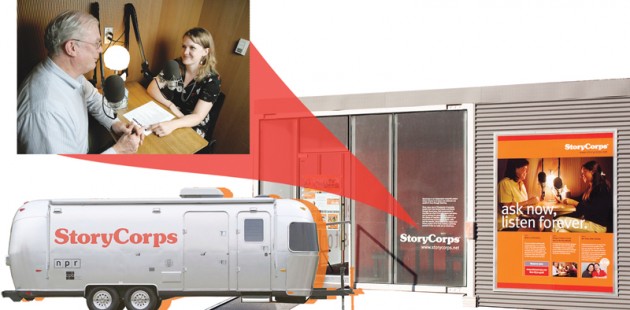StoryCorps makes life an open book

Everyone has a story. Every tear, laugh and tear-your-hair-out moment in life contributes another sentence, paragraph or chapter.
Unless you’re an autobiographer or reality TV star, chances are even your closest friends and relatives know only fragments of it.
With StoryCorps, however, everyone has a chance to share their stories.
Essentially, the organization is a fleet of recording stations in which anyone can interview whomever they like. After the interview is professionally recorded and edited, one copy goes to the interviewer and another is archived in the Library of Congress.
“StoryCorps is unique because we invite people to come into our space with someone they already know. The interviewers are not journalists or documentarians — they can ask questions that no one can think to ask,” said Marisa Karplus, senior coordinator of marketing and communications for StoryCorps.
The organization also operates several initiatives to gather stories from people in specific niches, including the Griot Initiative for blacks, the Memory Loss Initiative for those with Alzheimers and other memory impairments, the Sept. 11 Initiative for people affected by the 9/11 attacks and the Alaska Initiative for native Alaskans.
Future programs will focus on the stories of other groups, such as the Latino community.
“It’s something we see as a place to reach out to new populations so that our archive is as diverse and widespread as it can possibly be,” Karplus said.
NPR’s Morning Edition features one interview every Friday morning.
In addition to recording interviews, StoryCorps named last Friday the National Day of Listening to inspire families to share their stories. Additionally, Dave Isay, the founder of StoryCorps, chose 50 of the first 10,000 stories and included them in a book, Listening Is an Act of Love: A Celebration of American Life from the StoryCorp Project.
“Our mission is to honor and celebrate one another’s lives through listening. We believe strongly that the act of asking these questions and being interested is a way of showing someone they are honored and loved, and everyone wants to believe that they are honored and will not be forgotten,” Karplus said.
More than 16,000 StoryCorps interviews are available for listening in the American Folklife Center’s Folklife Reading Room at the Library of Congress in Washington, D.C.
For those unable to make the trip, some interviews are available online at npr.org and on the StoryCorps Web site, storycorps.net.
To record an interview, StoryCorps suggests a donation of $25. Most of StoryCorps’s funding comes from the Corporation for Public Broadcasting, according to its Web site.
Interviewers are expected prepare themselves for the interview. A facilitator is available for groups that want to ensure it goes smoothly, and the Web site includes a question generator for ideas, though the specificity of its suggested questions is limited.
StoryCorps and NPR are broadcast partners, and work with public radio stations on the mobile interview tours, Karplus said.
Partnering with local public radio station WMNF, StoryCorps will be in Tampa from Dec. 12 to Dec. 22 and Jan. 5 to Jan. 17. Interview reservations for the dates are being accepted and a second round of reservation is being held on Dec. 12 at storycorps.net.






